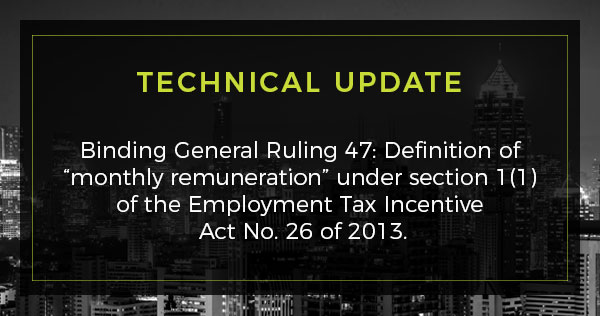Issue
What constitutes a “month” in the definition of “monthly remuneration”, as determined in section 1(1) of the Employment Tax Incentive Act No. 26 of 2013 (“ETI Act”), for employers remunerating employees on a weekly or fortnightly basis.
Facts
Section 2 of the ETI Act provides that an employer who are eligible to receive the Employment Tax Incentive (“ETI”) relating to a qualifying employee in respect of a “month”, may reduce the employees’ tax payable by that employer in an amount determined under section 7 of the ETI Act.
The meaning of a “month” is fundamental to establish firstly whether an employer is eligible to claim the ETI and secondly to determine the value of the ETI.
The word “month” is, however, not defined in the ETI Act and it is therefore necessary to refer to the Interpretation Act 33 of 1957 in which “month” is defined as “a calendar month”. The Collins Dictionary further defines a “calendar month” as “one of the twelve months of the year”. A calendar month may vary in duration between 28 and 31 days. A calendar month can therefore not be specified in terms of a fixed number of days.
Outcome
The ruling defines a “month” is as follows:
- Eligible employers that pay employees on a weekly or fortnightly basis may interpret a “month” referred to in the definition of “monthly remuneration” under section 1(1) to align with the period used for purposes of employees’ tax.
- Employers electing to use this method must apply it consistently throughout all periods during which weekly or bi-weekly payrolls are run.
- Should an employer at any time decide to revert to a calendar month, this ruling will no longer be available to such an employer.
- Reference to “month” in any other section of the ETI Act is interpreted and applied to mean a “calendar month”.
- This ruling constitutes a BGR issued under section 89 of the Tax Administration Act 28 of 2011.
Core Reasoning
Subject to meeting all the other requirements under the ETI Act, an eligible employer is entitled to claim the ETI only in the “month” in which the monthly remuneration is paid or payable to a qualifying employee.
“Monthly remuneration” is defined as the amount paid or payable in respect of a “month” that an employer employs and pays remuneration to a qualifying employee for at least 160 hours in a “month”, or an employer employs and pays remuneration to an employee for less than 160 hours in a “month” the amount as determined under section 7(5) of the ETI Act.
Interpreting the word “month” in the definition of “monthly remuneration” as a calendar month results in practical challenges where employees are paid on a weekly or fortnightly rather than a monthly basis. Depending on how the payroll is split, a week at the end or beginning of a calendar month may fall over two calendar months as a result thereof. A portion of the week’s wage will relate to the one calendar month’s remuneration while the other portion relates to the following calendar month’s remuneration for ETI purposes.
A misalignment between applying different periods for claiming the ETI and reporting for employees’ tax creates a risk for employers as well as SARS.
The practical challenges resulting from using different periods relating to the ETI and employees’ tax can be resolved by applying the reference to month in the definition of “monthly remuneration” as set out in the outcome above.
Applying the reference to month in this definition differently from the reference to month in all the other sections in the ETI Act may affect eligibility to claim the ETI in some instances.
Take away
Although a contentious issue, this Binding General Ruling will alleviate confusion on what constitutes a “month” for purposes of an employer having to determine the eligibility and value of ETI.
![2025-logo-[Recovered] Tax Consulting South Africa](https://www.taxconsulting.co.za/wp-content/uploads/2025/01/2025-logo-Recovered.png)



